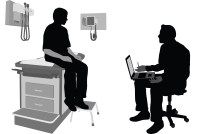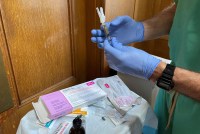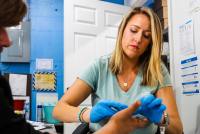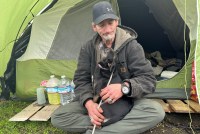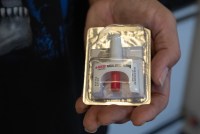Latest KFF Health News Stories
Tribal Nations Invest Opioid Settlement Funds in Traditional Healing To Treat Addiction
Hundreds of Native American tribes are getting money from settlements with companies that made or sold prescription painkillers. Some are investing it in sweat lodges, statistical models, and insurance-billing staffers.
San Francisco Tries Tough Love by Tying Welfare to Drug Rehab
Facing an overdose epidemic and public fury over conditions on the streets, famously tolerant San Francisco will start requiring welfare recipients to undergo drug screening, and treatment if necessary, to receive cash public assistance.
California Legislators Debate Froot Loops and Free Condoms
California state lawmakers this year are continuing their progressive tilt on health policy, debating bills banning an ingredient in Froot Loops and offering free condoms for high schoolers.
Cada vez mueren más menores por sobredosis. ¿Podrían los pediatras ayudar más?
La Academia Americana de Pediatría recomienda ofrecer buprenorfina a los adolescentes adictos a los opiáceos. Sin embargo, según los resultados de una encuesta, solo el 6% de los pediatras informa haberlo hecho alguna vez.
More Kids Are Dying of Drug Overdoses. Could Pediatricians Do More to Help?
The surge in overdose deaths among teens is opening a new path to treatment: pediatricians. A doctor in Massachusetts shows how it works with a 17-year-old patient.
Históricamente, las enfermedades vinculadas al abuso del alcohol han afectado más a los hombres. Pero datos actuales de los Centros para el Control y Prevención de Enfermedades (CDC) muestran que las tasas de muerte por esta causa están aumentando más rápido entre las mujeres que entre los hombres.
More Women Are Drinking Themselves Sick. The Biden Administration Is Concerned.
Historically, alcohol use disorder has disproportionately affected men. But targeted advertising and changes in societal norms over the past 50 years have led to an upsurge in alcohol-related diseases and deaths among women. “It’s a very taboo topic,” one expert said.
Amid Mental Health Staffing Crunch, Medi-Cal Patients Help One Another
Peer leaders can help ease the shortage of mental health providers and build trust through shared experiences, state health officials say. In 2022, California started allowing counties to use Medicaid dollars to pay them for their work.
West Virginia City Once Battered by Opioid Overdoses Confronts ‘Fourth Wave’
Years of struggle prepared residents in Cabell County, West Virginia, to confront the latest wave of the opioid epidemic as mixtures of fentanyl and other drugs claim lives nationwide.
En 2022, el año más reciente del que se dispone de datos, 7,385 californianos murieron por sobredosis relacionadas con opioides, de los cuales el 88% involucró fentanilo, un opioide sintético que puede ser 50 veces más potente que la heroína.
When It Comes to Ketamine, Meta’s Posting Policy Is No Party to Decipher
Despite growing awareness that the party drug is dangerous, the social media company is open to promotion of the drug in treating mental health.
Statistical Models vs. Front-Line Workers: Who Knows Best How to Spend Opioid Settlement Cash?
A mathematical model designed to direct spending of opioid settlement funds is at the center of a debate over whether to invest in technology to guide long-term decisions or focus on the immediate needs of people in addiction.
America Worries About Health Costs — And Voters Want to Hear From Biden and Republicans
The presidential election is likely to turn on the simple question of whether Americans want Donald Trump back in the White House. But health care tops the list of household financial worries for adults from both parties.
California Hospitals, Advocates Seek Stable Funding to Retain Behavioral Health Navigators
California has supported expanded use of medications in the fight against opioid use disorder and overdose deaths. But hospitals and addiction treatment advocates say the state needs to secure ongoing funding if it wants more behavioral health workers to guide patients into long-term treatment.
Mezcla letal: se extiende el uso de fentanilo con sedantes para caballos
La xilacina se utiliza para sedar a los caballos. Ahora la están mezclando con fentanilo. Es letal y la naloxona no frena las sobredosis.
Horse Sedative Use Among Humans Spreads in Deadly Mixture of ‘Tranq’ and Fentanyl
Illegal supplies of fentanyl are being cut with xylazine, a powerful horse tranquilizer. Overdoses involving this veterinary sedative are growing nationally and now Florida officials are tracking the deaths.
California Gov. Newsom Wants Voters to Approve Billions More to Help the Homeless. Will It Help?
A March 5 ballot initiative seeks $6.4 billion to build thousands of new housing units and provide mental health treatment for homeless people — on top of the billions already being spent to address the public health crisis. Despite significant support from health and law enforcement officials, many front-line workers are skeptical that more money is the answer.
Health Care Workers Push for Their Own Confidential Mental Health Treatment
Montana may join about a dozen other states in creating “safe havens” that keep health care professionals from facing scrutiny from licensure boards for seeking mental health or addiction treatment.
‘Fourth Wave’ of Opioid Epidemic Crashes Ashore, Propelled by Fentanyl and Meth
A report based on millions of urine drug tests found the United States is facing a rise in the use of multiple drugs at once, which not only is often more deadly but complicates treatment efforts.
California Prison Drug Overdoses Surge Again After Early Treatment Success
Drug overdose deaths in California state prisons rebounded to near record levels last year, a big setback for corrections officials who thought they were on the right track with medication-assisted treatment efforts. Prison officials and attorneys representing prisoners blame fentanyl.






